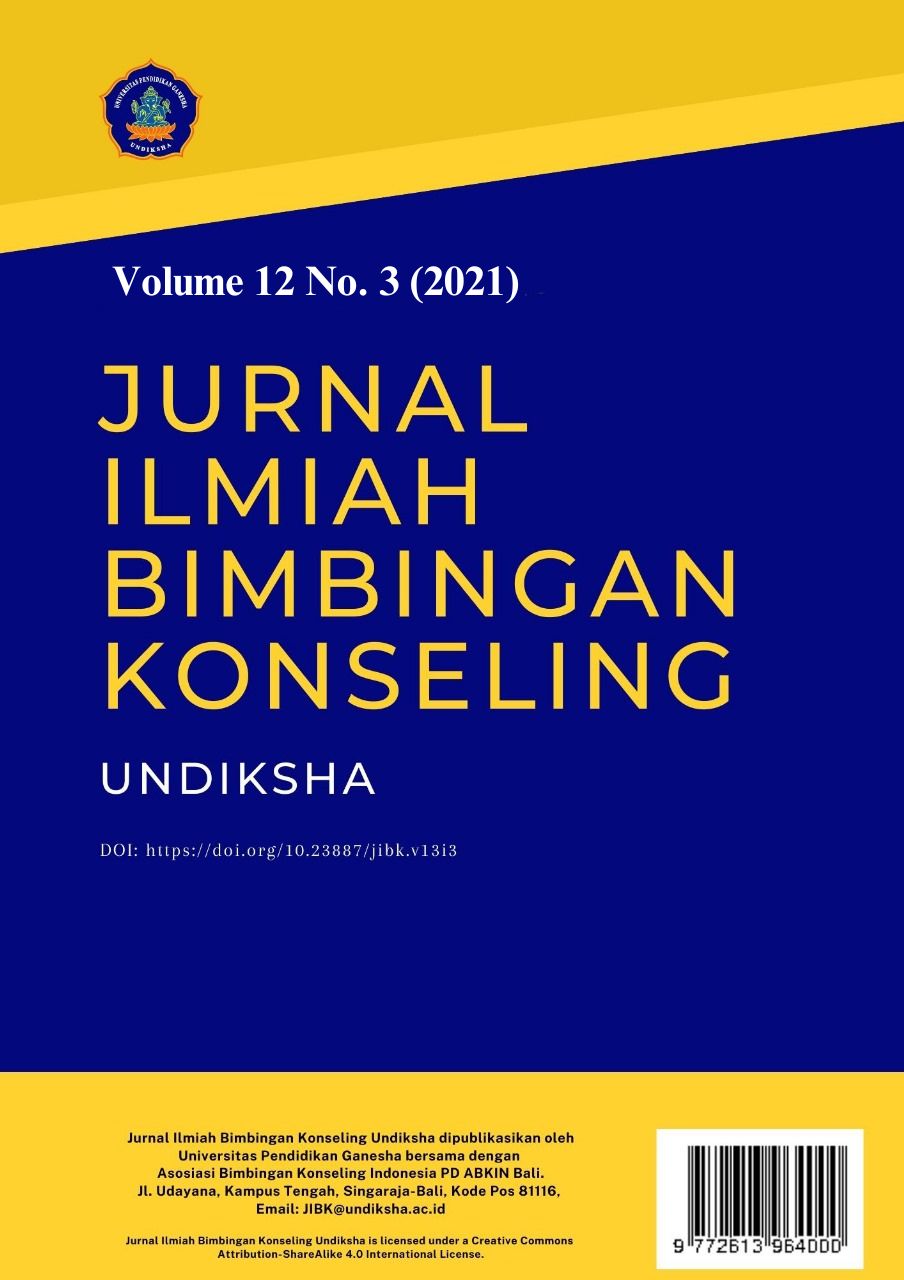Corporate Culture With Work Productivity Of Production Section Employees
DOI:
https://doi.org/10.23887/jibk.v12i3.38817Keywords:
produktivitas karyawan, budaya perusahaan, kinerjaAbstract
This study aims to determine the relationship between corporate culture and work productivity of production employees at PT. Noble Love Platform. One of the factors that affect work productivity is the company culture. This research is a type of quantitative research. In addition, in selecting the sample for this study, the authors used a purposive sampling technique. Employees selected as samples are production employees with a maximum working period of one year so that 80 employees are obtained. The data analysis technique used is Pearson's product-moment correlation with a negative correlation coefficient, which means that there is a significant negative relationship between corporate culture and employee productivity. The higher the corporate culture, the lower the work productivity of employees, and vice versa.
Abstrak:
Penelitian ini bertujuan untuk mengetahui hubungan budaya perusahaan dengan produktivitas kerja karyawan bagian produksi di PT. Wahana Kasih Mulia. Salah satu faktor yang mempengaruhi produktivitas kerja adalah budaya perusahaan. Penelitian ini merupakan jenis penelitian kuantitatif. Selain itu, dalam pemilihan sampel penelitian ini, penulis menggunakan teknik purposive sampling. Karyawan yang dipilih menjadi sampel adalah karyawan produksi dengan masa kerja maksimal satu tahun sehingga diperoleh 80 karyawan. Teknik analisis data yang digunakan adalah korelasi product-moment Pearson dengan koefisien korelasi negatif, yang berarti terdapat hubungan negatif yang signifikan antara budaya perusahaan dengan produktivitas kerja karyawan. Semakin tinggi budaya perusahaan maka semakin rendah produktivitas kerja karyawan, begitu pula sebaliknya.
References
Ainisyfa, H., Ali, R., & Ramdhani, A. (2017). Model Conceptual Framework of Corporate Culture Influenced on Employees Commitment to Organization. Journal International Business Management, 11 (3), 826-830. DOI: 10.3678/ibm2017.826.830 DOI: https://doi.org/10.36478/ibm.2017.826.830
Azwar, S. (2011). Realibilitas dan Validitas. Yogyakarta: Pustaka Pelajar
Azwar, S. (1999). Penyusunan Skala Psikologi. Yogyakarta : Pustaka Pelajar
Eliphas, M., Mulongo, L., & Razia, M. (2018). The influence of performance appraisal practices on employee productivity: A case of Muheza District, Tanzania. Journal IBME, 5(4), 45-59. DOI: 10.15739/IBME.17.006 DOI: https://doi.org/10.15739/IBME.17.006
Fey, C., & Denison, D. (2003). Organizational culture and effectiveness: Can an American Theory be applied in Russia?.William Davidson Institute Working Paper Number 598 DOI: https://doi.org/10.2139/ssrn.577141
Gawi, O., & Muayyad, D. (2016). Pengaruh Kepuasan Kerja Terhadap Produktivitas Kerja Terhadap Produktivitas Kerja Pegawai Bank Syariah X Kantor Wilayah II. Jurnal Manajemen dan Pemasaran Jasa, 9 (1), 75-97. DOI: 10.25105/jmpj.v9i1.1396 DOI: https://doi.org/10.25105/jmpj.v9i1.1396
Hamdi, A., & Massoudi, H. (2017). The Consequence of Work Environment on Employees Productivity, Iraq. IOSR Journal of Business and Management (IOSR-JBM), 19, 35-42. e-ISSN: 2278-487X DOI: https://doi.org/10.9790/487X-1901033542
Haseeb, R., Rehman, S., Sahid, M., & Asif, M. (2018). Leadership Styles, Organizational Culture and Employees’ Productivity: Fresh Evidence from Private Banks of Khyber-Pakhtunkhwa, Pakistan. Abasyn Journal of Social Sciences, 8, 1-12.
Kant, A., Khan, A., Naqvi, h., & Khan, N. (2020). Job Stress and Employees’ Productivity: Case of Azad Kashmir Public Health Sector. Interdisciplinary journal of contemporary research in business, 5, 525-542
Lawlor, A. (1985). Productivity Improvment Manual. England: Gower Publishing Company Limited
Okesina, O., Iyiola, O., Benjamin, O., Opeyemi, O. & Oluwabusola, D. (2018). The Roles of Organizational Culture in Organizational Productivity (A Study of May And Baker Nig. Plc Ota, Ogun State). Journal of Business and Management, 20 (1), 5-12.
Nakhaei, H. Kabriaei, A. & Mahdiyeh, M. (2016). Impact of Organizational Culture on Productivity: A Study among Employees of Ministry of Youth and Sports, Iran. International Journal Of Humanities and Cultural Studies, 3 (3), 170-177
Nusran, M., & Lantara, D. (2019). Dunia Industri dan Perspektif Psikologi Tenaga Kerja. Makassar: Nas Media Pustaka.
Pech, S., & Slade, M. (2006). The role of environmental control on environmental satisfaction, communication, and psychological stress: effects of office ergonomics training. Environment and Behavior, 36 (1), 617-638.
Rakhmawati, I. (2016). Dampak Produktivitas Kerja Islami Bagi Kinerja Karyawan. Jurnal Iqtishadia, 9 (1), 159-178 DOI: https://doi.org/10.21043/iqtishadia.v9i2.1732
Robert, S., Drastitin. & Nurminingsih. (2016). Pengaruh Budaya Organisasi Terhadap Produktivitas Kerja Karyawan Pada Pengelola dan Pengembangan. Jurnal Administrasi dan Manajemen, 7 (1), 328-336
Shahid., M. (2012). Work stress and employee performance in banking sector evidence from district Faisalabad. Book of Business and Management Sciences. Pakistan.
Sugiyono. (2013). Metode Penelitian Kuantitatif, Kualitatif dan R&D. Bandung: Alfabeta.CV
Tohardi, A. (2002). Pemahaman Praktis Manajemen Sumber Daya Manusia. Bandung
Vyas, S. (2017). Organization Culture and Employee’s Productivity “A Study of Pharmaceutical Industry”. International Journal of Research and Scientific Innovation (IJRSI), 4,15-20
Webber, J., Ser, E., & Goussak, G. (2015). Work Habits As Positive and Negative Influence on Workplace Productivity. Global Journal of Business Research. 9, 39-48. ISSN: 2157-0191
Werther, B., & Davis., K. (1993). Human Resource and Personnel Management (4th ed). Mc Graw: Hill International
Downloads
Published
Issue
Section
License
Copyright (c) 2021 Marcella Widi Aryandini

This work is licensed under a Creative Commons Attribution 4.0 International License.
Jurnal Ilmiah Bimbingan Konseling Undiksha is an Open Access Journal. The authors who publish the manuscript in this journal agree to the following terms:
JIBK is licensed under a Creative Commons Attribution 4.0 International License. This permits anyone to copy, redistribute, remix, transmit and adapt the work provided the original work and source is appropriately cited.
This means:
Jurnal Ilmiah Bimbingan Konseling is licensed under a Creative Commons Attribution 4.0 International License.
(1) Under the CC-BY license, authors retain ownership of the copyright for their article, but authors grant others permission to use the content of publications in JIBK in whole or in part provided that the original work is properly cited. Users (redistributors) of JIBK are required to cite the original source, including the author's names, JIBK as the initial source of publication, year of publication, volume number, issue, and Digital Object Identifier (DOI); (2) The authors are the copyright owner of the article, and the author grants the JIBK held the first publication right.









.png)

.jpg)
